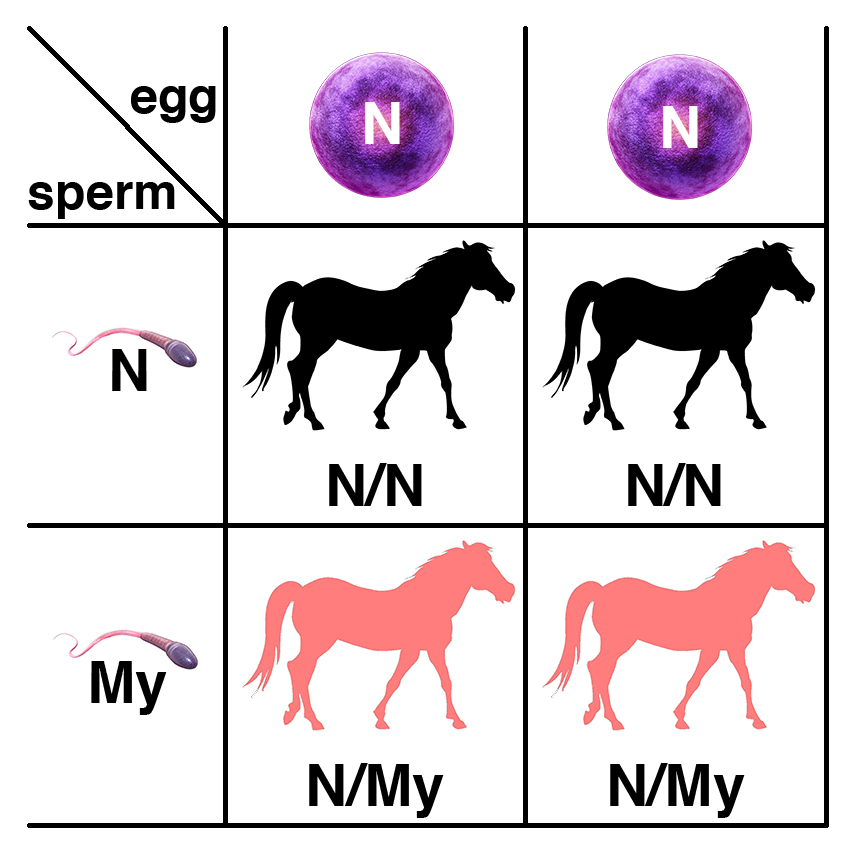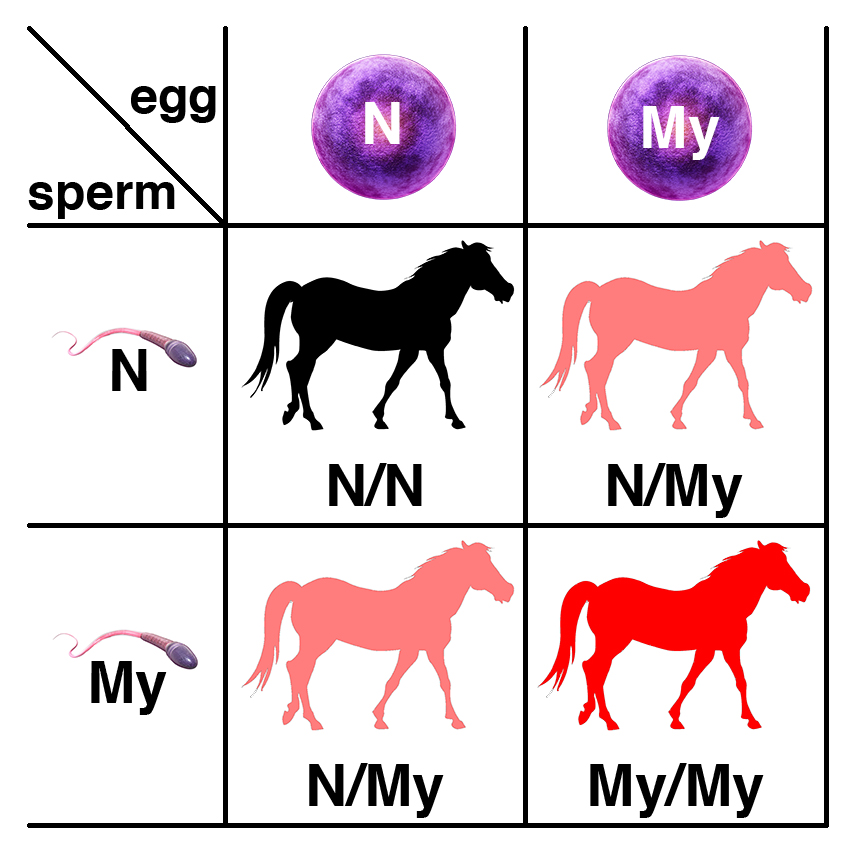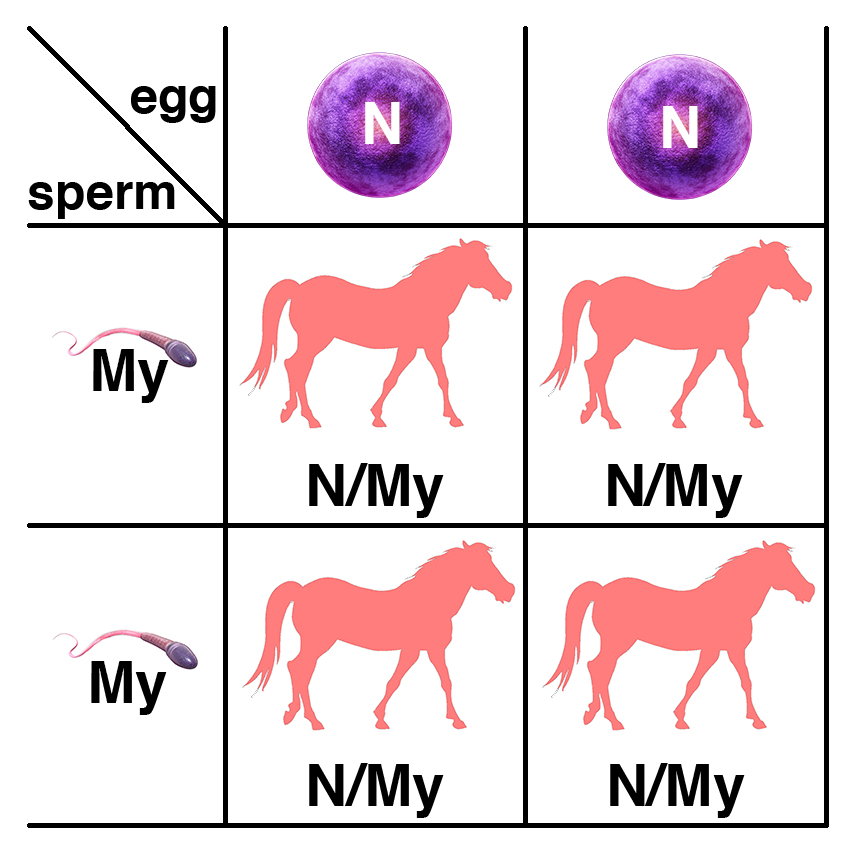| Contents |
|---|
| Immune-Mediated Myositis |
| Summary |
| Understanding the Results |
| What You Can Do |
| Disease Name and Genes |
| Inheritance |
| Resources |
Immune-Mediated Myositis
Summary
Immune-mediated myositis (IMM) is an autoimmune disease characterized by rapid-onset muscle wasting and the presence of lymphocytes in skeletal muscle. The disease has both environmental and genetic components. The environmental component is recent infection, particularly with Streptococci, or vaccination against influenza, Equine Herpes Virus 4, or strangles (Streptococcus equi). One of the genetic components is MYH1-E321G, a variant of a gene encoding one of the myosin heavy chains.
The MYH1-E321G variant has incomplete penetrance. Not all horses with one or two copies of this variant will develop IMM. There are also horses that appear to have IMM even though they do not have the MYH1-E321G variant; these may be other inflammatory myopathies with a different etiology.
So far, the MYH1-E321G variant has only been identified in Quarter Horses. It was not found in a sample of 175 horses representing 21 breeds not including Quarter Horses.
Date of Last Update: 06/15/2018
Results
Understanding the Results
Results of the genetic test for IMM are presented as shown below.
| Immune-mediated myositis (IMM) | ||
|---|---|---|
| N/N | Clear | This horse tested negative for MYH1-E321G and does not carry the MYH1 mutation identified in Quarter Horses. |
| N/My | Affected | Both the normal and mutant alleles are present. This horse is positive for the MYH1-E321G mutation and may develop symptoms. |
| My/My | Affected | This horse carries two copies of the MYH1-E321G mutation and may develop symptoms. |
What You Can Do
If you have a Quarter Horse that shows rapid muscle loss in the back (epaxial) and rump (gluteal) muscles shortly after an infection or vaccination, you should seek a diagnosis from your veterinarian. If your horse has tested positive for the MYH1-E321G variant, you should share this information with your veterinarian. IMM responds well to treatment with corticosteroids.
Disease Name and Genes
Immune-mediated myositis (IMM) is associated with a missense mutation in the MYH1 gene that encodes one of the myosin heavy chains (MYH1-E321G). The mutation causes a nonconservative amino acid substitution in a highly-conserved position in the myosin head.
Inheritance
IMM is associated with a dominant allele of the MYH1 gene (MYH1-E321G) that has incomplete penetrance. The dominant allele is commonly abbreviated as My, with the recessive wild-type allele abbreviated as N.

A horse with one copy of the dominant allele (N/My) will potentially have symptoms. If this horse is bred to a normal horse (N/N), each foal has a 50% chance of having one copy of the dominant allele (N/My) and a 50% chance of having two copies of the normal allele (N/N).

If two horses, each with one copy of the dominant allele (N/My) are bred, each foal has a 25% chance of having two copies of the normal allele (N/N), a 50% chance of having one copy of the dominant allele (N/My), and a 25% chance of having two copies of the dominant allele (My/My). Because horses with one copy (N/My) or two copies (My/My) of the dominant allele have the potential to be affected, each foal will have a 75% chance of potentially being affected.

If a horse with two copies of the dominant allele (My/My) is bred to a normal horse (N/N), all of the foals will have one copy of the dominant allele (N/My) and will potentially be affected.
Resources
The Veterinary Genetics Laboratory at UC Davis offers a genetic test for MYH1-E321G.





